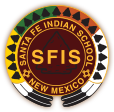Academics
Educator Profiles
View AllLisa Longeteig
History
HS Academics
Craigmont, ID

I obtained my B.A. in International Studies from the University of Idaho and my M.A. in Education from the College of Santa Fe. Prior to coming to SFIS, I taught in Bolivia in the Peace Corps; I taught English through a private company in Japan and taught at the Centro de Educación Creativa in Monteverde, Costa Rica. At SFIS, I teach New Mexico History, Native American History and US History.
I think of myself as a lifelong learner, and even a permanent student. I love education. I love learning, and that’s one of the reasons I love being in the classroom. If I’m not learning, I’m not really satisfied either, and I learn a lot from my students. I’m drawn to education because education reflects social justice. Education is the great equalizer, and teaching is one of the ways I can contribute to that. I think education is one of the few avenues we have left in our society where people have access to better themselves, and I think it’s important that everyone has equal access to a good education. That’s a piece I can play in my role—I can’t be a politician, and I feel like it’s very grassroots to be in the educational realm.
I was drawn to SFIS because of the student population. I was really intrigued by Indigenous cultures, having lived in South America and growing up in Idaho on the Nez Perce reservation. I thought I could really learn a lot here, and that has been the case. Students have taught me so much about their culture and the history of the school—I think this is a school with incredible opportunity. It’s up to the students a lot of the ways, when they do, the doors are wide open. I think it’s such a strong school in terms of opening up their eyes to the possibilities.
I try to mirror tolerance through teaching about globalism—how we’re connected. I like to do role-plays in the class, and it’s really fun. One of the really good role plays with freshmen is when we study the US-Mexican War and there’s a lot of misunderstanding— there’s such a divide about Mexico and the U.S. I like studying the history of that war because when we study New Mexico, students see that the Pueblos were caught in the middle of these different colonizers. And it opens their eyes about the history of the country and where we are now. When I teach about globalism, I refer to my experiences. For example, when I lived in Bolivia I lived with Quechua people in a Quechua village. There are so many similarities because they are very traditional. I bring in a picture of Evo Morales and every year, someone says, "That looks like my uncle!" I love that light bulb that comes up when they see photographs of dances. They see that there is a connection. So, my class is really more of an Indigenous history of the Americas.
I think a culturally responsive education is really important here. I think giving back is important and that’s what I want to build more of—service learning opportunities and cultivating responsibility. My own passion is reading. I love to read—I’m a news nerd. And travel. And gardening—I spend a lot of time growing food. For SFIS students, I wish that they are successful in really walking in two worlds. I want them to be the cultural warriors. I expect them to be the modern warriors that are out there fighting social issues. But at the same time I expect them to find their own path and satisfaction in their own life, and I hope they have options.
